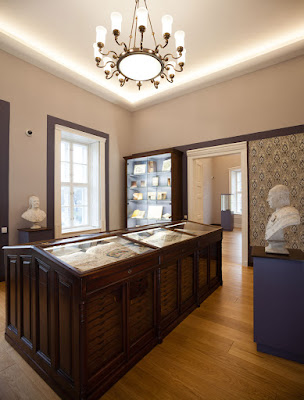[ad_1]
From the 11th to the 31st of March, an exhibition presents the medieval manuscripts of the Cathedral Libray of Esztergom. Titled “For They Watch for Your Souls…” – Codices in the Cathedral Library of Esztergom, the exhibition is on view in the newly restored exhibition rooms of the Bibliotheca.
After the library moved back to Esztergom in 1853, János Scitovszky (1785-1866), archbishop of Esztergom, József Dankó and Nándor Knauz, canons of Esztergom each bequeathed four codices to the collection. Among these, there was a 12th-century cathedral schoolbook containing a commentary of the Song of Songs among other texts, and several manuscripts of Bohemian origin.
Most codices in the library originated and were used in Central Europe, in Bohemia, Vienna, and Southern Germany. Nevertheless, some of the manuscripts came from the English, Italian, and French territories. The decoration of Peter Lombard’s commentary on the Psalms is a high-quality product of English miniature painting. The exhibited manuscripts present a wide range of medieval ecclesiastical literature encompassing books on liturgy, theology, church law, astronomy, lexicography, as well as sermon collections, prayer books, and schoolbooks.
The exhibition coincides with the publication of a catalog describing with great erudition the medieval manuscripts preserved in the Esztergom book collections (The Codices of the Cathedral Library of Esztergom, the Archiepiscopal Simor Library, and the Esztergom City Library). The book was edited by Edit Madas and written by Kinga Körmendy, Judit Lauf, Edit Madas, and Gábor Sarbak. Kinga Körmendy’s thorough introduction presents the history of the collections and the detailed descriptions are accompanied by various indices, appendices, a bibliography, and color plates. The book is the most recent volume of the Fragmenta et codices in bibliothecis Hungariae series. The book can be ordered here: [email protected]. A German-language version of the catalog is forthcoming.
(Text and photos by the Cathedral Library of Esztergom)
[ad_2]
Source link






More Stories
Things to Consider Before Running a Half Marathon
Penn State Trademark Case Produces Potential Problems For Sports Teams And Merchandisers
How to Make Your Social Media Posts Snap!